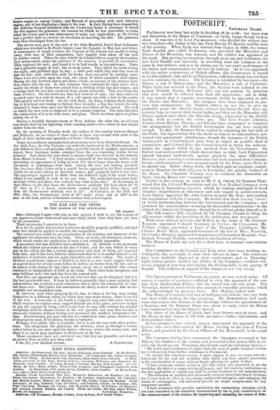THE BAR AND THE PRESS.
TO THE EDITOR OF THE SPECTATOR.
41h Atujust.
8m—Although I agree with you on this sulect, I wish to see the reasons of our opponents better understood and more fairly stated than they have yet been by the journalists.
Their arguments I conceive to be these. It is for the public interest that barristers should be properly qualified, and that some test should be applied to exclude the unqualified.
The natural test would be, an examination of the learning and character of the applicants for admission into the body. There are many circumstances, however, which would render the application of such a test virtually impossible. A pecuniary test has therefore been substituted. In addition to the payments which the student must make to his Inn of Court, and the sum which he must pay on his call to the bar, a certain appearance and style of living are expected ft0111 him; and it has been hitherto understood that he is to confine himself to his profession of barrister, and not apply himself to any other calling. The result of all these requisitions, express or implied, is, that as a man must support himself as a gentleman for several years before he derives an income from the law, and as he cannot make money by any other means, every one is excluded who cannot command an independence of 250/. at the least. There have been exceptions, and some brilliant ones; but such has been the general rule.
Now this, our opponents say, is not the best test that can be imagined: but it is the best practicable test. It may be inferred generally, that a man enjoying that independence has received a good education, and is above the temptation to com- mit mean acts. His habits and associations are likely to have made him an ho- mumble and accomplished man. 14 however, men while studying for the bar, or when at the bar, may occupy themselves in a different calling by which they may make money, there is an end of the test. A man who is not worth a sixpence may enter into some business which requires no capital—may support himself out of his gains, and save enough to pay the expense of being called to the bar: he may still continue his original oecupation until he obtains clients in his new pursuit, and may thus become a successful barrister without having ever possessed the smallest independent for tune. Henceforward, any man who has not committed some gross notorious act of impropriety may, if he pleases, become a barrister.
• Perhaps, it is added, this is desirable; but it is not the case with other profes- sions. The clergyman, the physician, the attorney, must go through a certain ordeal before be can enter upon his duties; whereas, remove the money-test, and there is no check upon ignorance or dishonesty at the bar.
. These arguments have not convinced me; but they are plausible, and deserve an answer from an abler pen than mine.


























 Previous page
Previous page